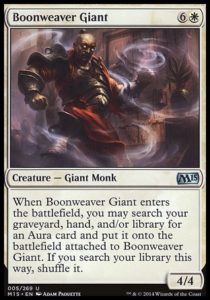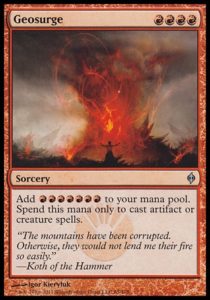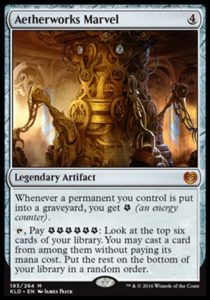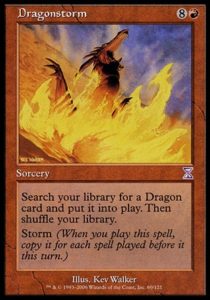[casthaven]Tinker[/casthaven] is one of the most broken Magic cards of all time. For the low cost of your worst artifact on the battlefield, you get the most powerful artifact or artifact-combo-piece available, such as [casthaven]Blightsteel Colossus[/casthaven] or half of [casthaven]Time Vault[/casthaven]/[casthaven]Voltaic Key[/casthaven]. Due to its immense power and ease of abuse, [casthaven]Tinker[/casthaven] is rightfully banned in every format other than Vintage. That said, we keep seeing new Tinker effects being made all the time.

Plenty of Tinkers
Magic has many, many Tinker effects. These are cards that search your library (sometimes part of your library) for a card (almost always with specific properties) and put it directly onto the battlefield (usually) without paying its mana cost. These cards play in some of the most dangerous design space, that which is ripe for exploitation. After all, [casthaven]Demonic Tutor[/casthaven] is already a broken card just for letting you find the card you need, but a Tinker effect lets you find it and cheat it into play.
Many Tinker effects are innocuous. [casthaven]Boonweaver Giant[/casthaven] is both incredibly expensive and restrictive (you almost never want to use it to find a [casthaven]Pacifism[/casthaven]). Sure, it can fetch you an [casthaven]Eldrazi Conscription[/casthaven], but not at a substantial discount—though it’s worth noting, [casthaven]Sovereigns of Lost Alara[/casthaven] saw Standard play for its ability to fetch Conscription with haste for six mana. [casthaven]Panglacial Wurm[/casthaven] can be “tinkered” out with any fetchland, but does so at an exorbitant cost and has none of the flexibility of other [casthaven]Tinker[/casthaven] effects. [casthaven]Yisan, the Wanderer Bard[/casthaven] does the exact same thing [casthaven]Birthing Pod[/casthaven] does without requiring the sacrifice of a creature, but does so at such a slower speed, higher cost, and on a more fragile permanent type that it’s likely never going to be broken.
That leads us to the heart of the matter, which is what differentiates a broken [casthaven]Tinker[/casthaven] effect from a fair one.

All about the mana
Tinker effects have many factors. They have flexibility—[casthaven]Collected Company[/casthaven] can only find small-to-midsize creatures, whereas [casthaven]Chord of Calling[/casthaven] can find any creature. The more flexible a Tinker, the more likely it can find something powerful while also acting as a toolbox ([casthaven]Panglacial Wurm[/casthaven] is accordingly the least flexible Tinker around). Each has a cost—[casthaven]Kuldotha Forgemaster[/casthaven] costs three artifacts to use, while [casthaven]Whir of Invention[/casthaven] just needs to be cast. They have a range—[casthaven]Dark Supplicant[/casthaven] searches three different zones, while [casthaven]Dragon’s Herald[/casthaven] searches one, and [casthaven]Collected Company[/casthaven] only searches the top six cards of your library (and [casthaven]Unexpected Results[/casthaven] only searches the top card of your library). There are other factors—producing card advantage like [casthaven]Tooth and Nail[/casthaven], being recursive like [casthaven]Defiant Falcon[/casthaven], or harder to use like [casthaven]Oath of Druids[/casthaven]—but the most important factor is probably mana.
The best [casthaven]Tinker[/casthaven] effects let one cheat egregiously on mana. [casthaven]Tinker[/casthaven] is a three mana spell which can fetch a twelve mana [casthaven]Blightsteel Colossus[/casthaven] (or even a sixteen mana [casthaven]Draco[/casthaven], but that’d likely just be for style points). [casthaven]Stoneforge Mystic[/casthaven] not only has a large amount of flexibility and has powerful targets, it can also cheat in a Batterskull for two installments of 1W. [casthaven]Nahiri, the Harbinger[/casthaven] suffers from being vulnerable to attack and requiring a few turns to set up, but she can nevertheless turn four mana into a fifteen mana (hasty) [casthaven]Emrakul, the Aeons Torn[/casthaven].

Tinkering around in Standard
I’ve been thinking about [casthaven]Tinker[/casthaven] effects a lot lately. After all, we’ve seen some shockingly powerful Tinkers in the past two years. [casthaven]Collected Company[/casthaven] was and [casthaven]Aetherworks Marvel[/casthaven] is one of (if not the) best cards in Standard. Both cards require substantial deckbuilding concessions. Both cards have dramatic, game-winning effects. They also share a quality which likely dramatically decreased their mana cost: variance.
They have the possibility of giving you a dramatic discount, but because they can miss, you need to fill your deck with things for them to hit. They don’t function as toolboxes which allow you to fetch one-of silver bullets, they’re win-conditions. There is also no way to guarantee that they’ll hit, so their emphasis is less on finding the right card and more on crossing your fingers and hoping to hit something spectacular.
Now, I don’t mean to suggest that variance is bad. Variance is wonderful (even though it does mean games every now and then are completely one-sided). However, variance is the likely culprit for why these cards cost so little mana for their effect. Imagine if [casthaven]Aetherworks Marvel[/casthaven] let you search your entire deck for any spell and cast it for free. How much should that cost? Twelve mana? Six mana and twelve energy per use? Imagine if [casthaven]Collected Company[/casthaven] searched your whole deck. It would probably only find one creature (and might still have to cost 4G, or be a sorcery).
I recognize that searching the top six cards is a real downside, but I don’t believe it’s so dramatic a downside as to justifiably knock off so many points of mana. I recognize that searching a limited portion of one’s library disallows the degeneracy of [casthaven]Birthing Pod[/casthaven] decks full of one-of answers, but it also means that games are won or lost based on the location of Eldrazi titans or [casthaven]Reflector Mage[/casthaven]s. Yes, games are already won or lost based on the location of desirable cards in one’s shuffled deck, but we’ve now had years of Standard defined by decks which lampshade that variance.

Less Tinkers, More Sailors, Soldiers, and Spies
I believe that Magic is best off if [casthaven]Tinker[/casthaven] effects either aren’t costed for Constructed, aren’t able to find anything particularly powerful, or don’t function in Standard. Furthermore, making them random (but look at a large amount of cards) leads to less satisfying games, where the focus is shifted from player-player interaction or playing to your outs and directly onto the contents of a shuffled deck.
[casthaven]Tinker[/casthaven] effects being random also increases the likelihood that they’ll be undercosted. Hopefully, Magic is going to take a good, long break from powerful Tinkers. We can still have plenty of things like [casthaven]Gate to the Afterlife[/casthaven], [casthaven]Whir of Invention[/casthaven], or even [casthaven]Eldritch Evolution[/casthaven] (which is begging to be broken, but hasn’t been so far—probably because it costs three mana and a creature and only cheats you up two mana in normal circumstances).
And that’s all for this week. Hopefully you’ve enjoyed this foray into the wonderful, wide world of Tinkers.
And, as always, thanks for reading.
—Zachary Barash
Zachary Barash is a New York City-based game designer. He learned Magic in 1994 and is still afraid of [casthaven]Living Wall[/casthaven] (don’t click it! It’ll see you!). He just received his MFA in Game Design at NYU and designs for Kingdom Death: Monster.
His favorite card of the month is [casthaven]Supernatural Stamina[/casthaven]. It’s a one-mana combat trick that doesn’t actually save a creature from dying… except it does, blinks it, and kind of exerts it. It manages to tell a whole lot of story and be a powerful, flexible combat trick for only one mana.

